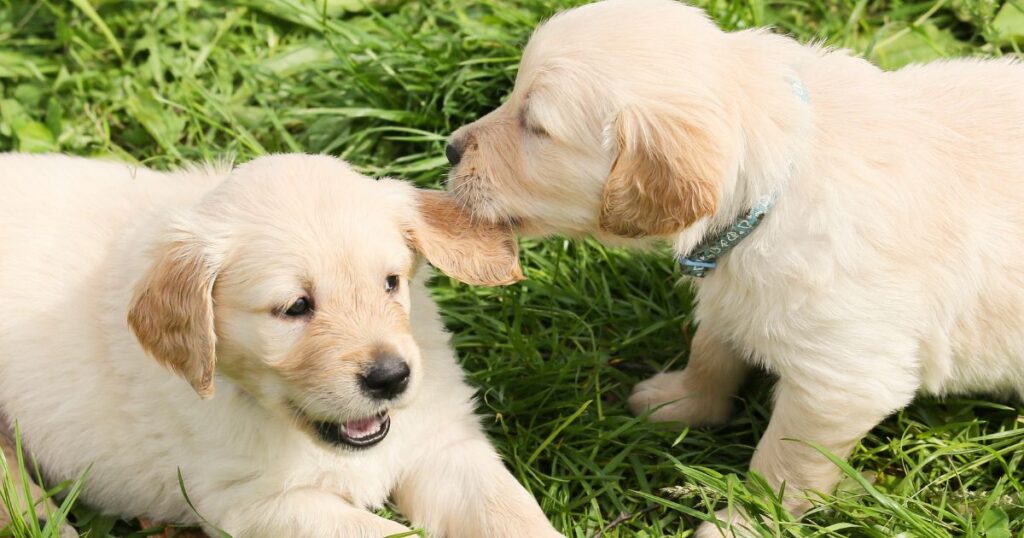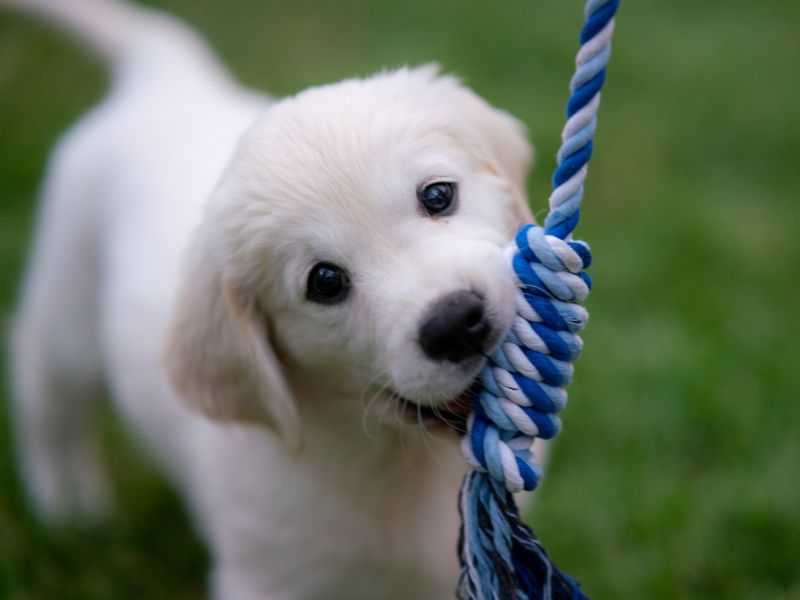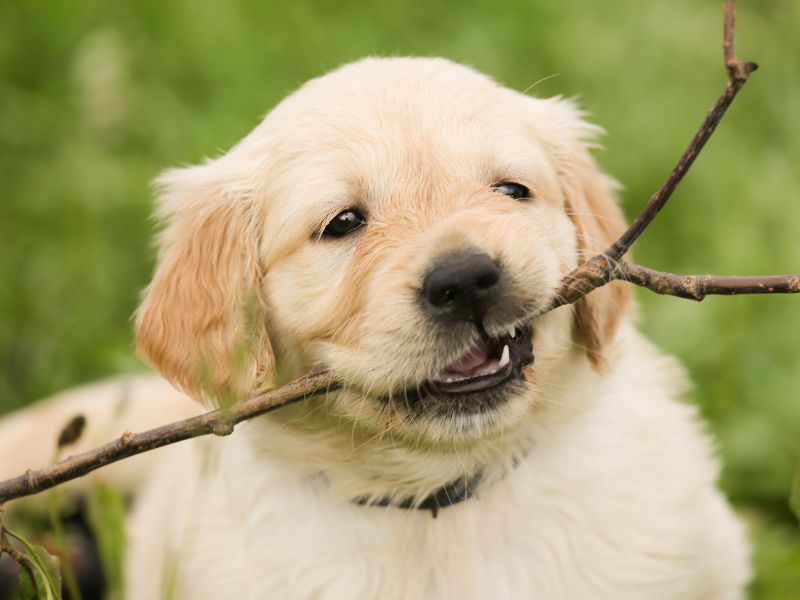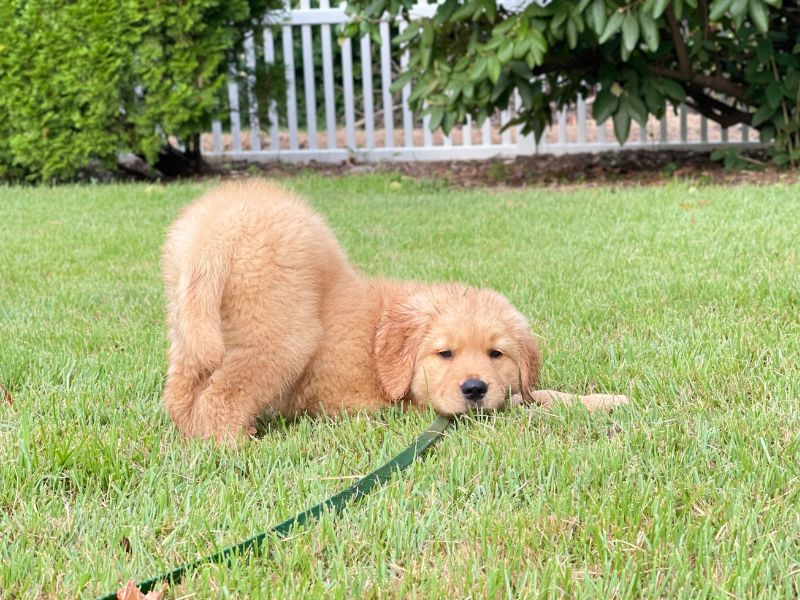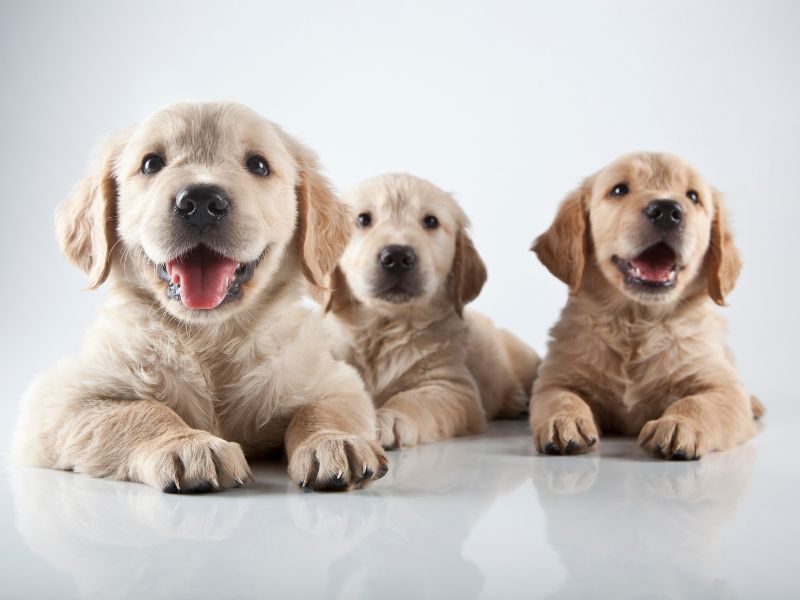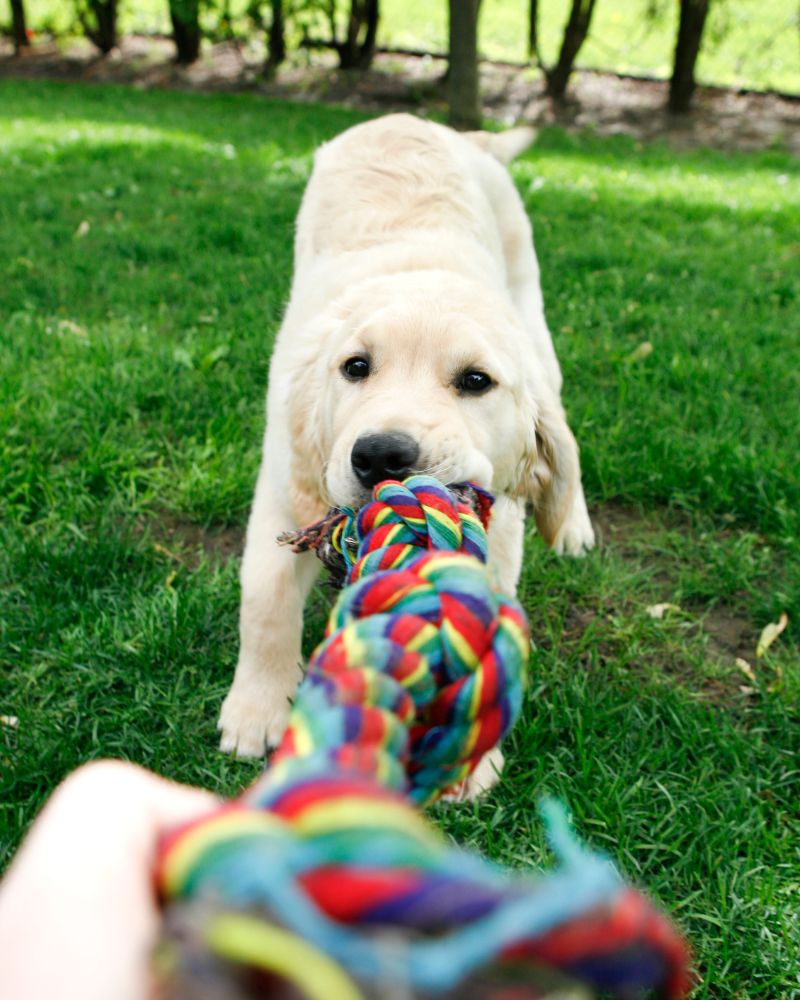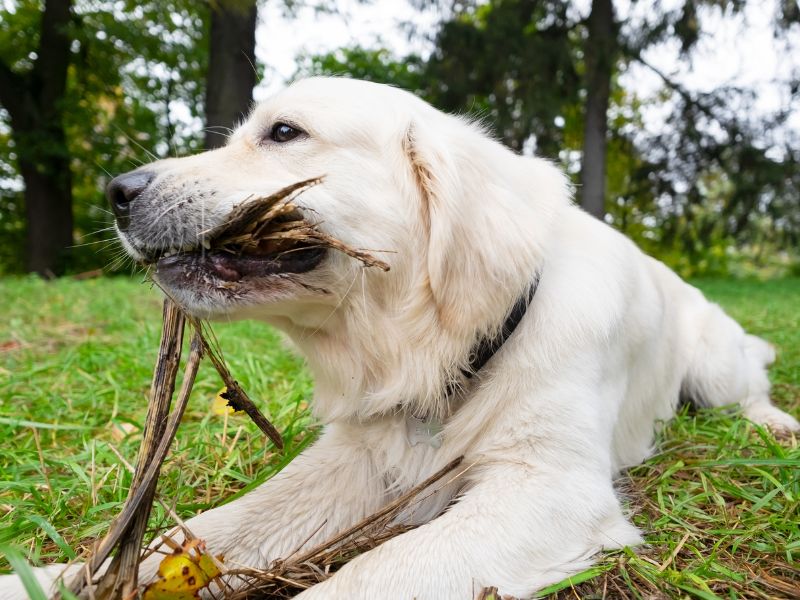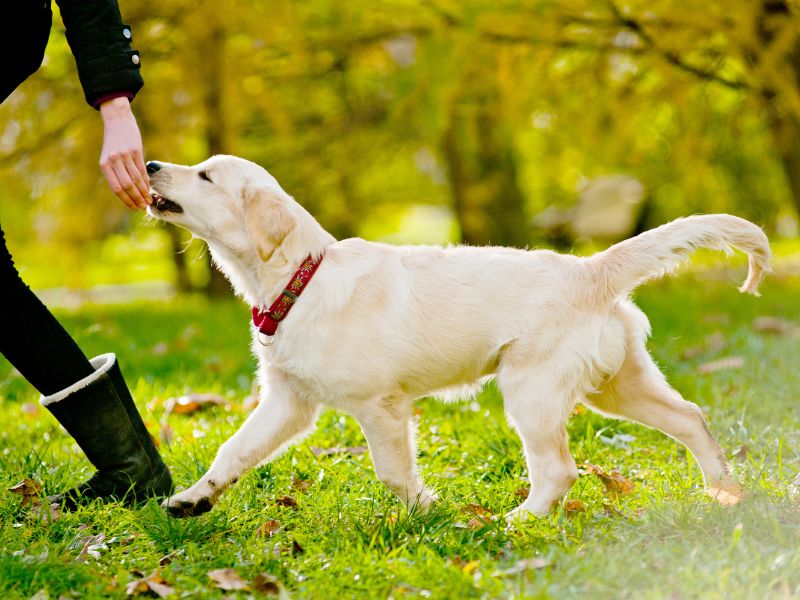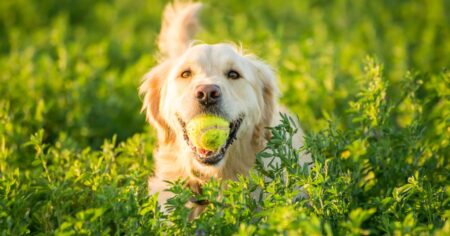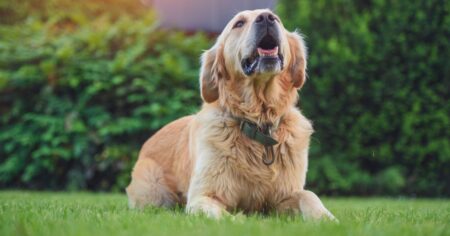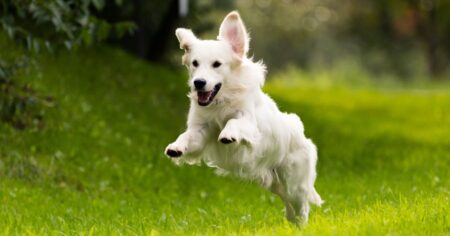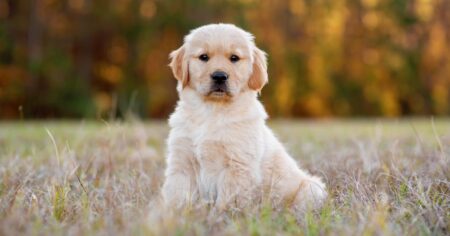Golden retriever puppies are known for their adorable faces, fluffy fur, and playful personalities. However, one common issue that many new puppy owners face is biting. While it may seem harmless at first, biting can quickly become a problem if not addressed early on.
There are several reasons why a golden retriever puppy may bite. Puppies explore the world around them with their mouths, and biting is a natural behavior for them. Additionally, puppies may bite out of fear, frustration, or excitement. It’s important for owners to understand these reasons and take steps to address the behavior in a positive and effective way.
Why Do Golden Retriever Puppies Bite So Much?
Golden Retriever puppies are known for their playful and friendly nature, but they can also be quite mouthy. It’s not uncommon for a Golden Retriever puppy to bite or chew on anything they can get their teeth on, including their owner’s hands, feet, and clothing.
One reason why Golden Retriever puppies bite so much is because they are teething. Just like human babies, puppies go through a teething phase where their baby teeth fall out and their adult teeth come in. During this time, their gums may be sore and they may feel the need to chew on things to relieve the discomfort.
Another reason why Golden Retriever puppies bite is because they are exploring their environment. Puppies use their mouths to investigate their surroundings and learn about the world around them. They may also bite as a way to initiate play or attention from their owners.
It’s important to note that while Golden Retriever puppies may bite more than other breeds, excessive biting can be a sign of an underlying issue, such as anxiety or boredom. It’s important to provide plenty of toys and mental stimulation for your puppy to prevent excessive biting.
Overall, biting is a natural behavior for Golden Retriever puppies, but it’s important to train them to have bite inhibition and redirect their biting behavior onto appropriate toys and chew items.
Acquired Bite Inhibition (ABI)
Acquired Bite Inhibition (ABI) is a crucial skill that every puppy must learn. It refers to a dog’s ability to control the force of its bite. Puppies learn ABI from their littermates and mother during playtime. When a puppy bites too hard during play, its littermate or mother will yelp and stop playing. This teaches the puppy that biting too hard is not acceptable behavior.
Puppies who do not learn ABI during their early stages may grow up to be aggressive dogs. This is because they do not know how to control their biting force, and may end up causing harm to humans or other animals. The good news is that ABI can be taught even if a puppy did not learn it during its early stages.
Owners can teach ABI by mimicking the behavior of a puppy’s littermate or mother. When a puppy bites too hard, the owner should yelp and stop playing. This teaches the puppy that biting too hard is not acceptable behavior. Over time, the puppy will learn to control its biting force.
It is important to note that teaching ABI takes time and patience. Owners should not expect their puppy to learn this skill overnight. It may take several weeks or even months for a puppy to learn ABI. However, with consistent training and positive reinforcement, owners can help their puppy develop this crucial skill.
How Do Puppies Learn ABI?
Puppies are known for their playful nature, and one of the most common behaviors they exhibit is biting. However, biting can become a problem if it is not addressed early on. Puppies learn a lot of things during their early life, including how to interact with other dogs and humans. One of the things they learn is ABI, which stands for “bite inhibition.”
Bite inhibition is the ability of a puppy to control the force of its bite. Puppies learn ABI through interactions with their littermates and mother. When a puppy bites too hard during play, its littermates will yelp or stop playing, which teaches the puppy that biting too hard is not acceptable. The mother of the puppy also plays a role in teaching ABI. If a puppy bites too hard while nursing, the mother will stop nursing or move away, which teaches the puppy that biting too hard is not acceptable.
It is important to note that puppies need to learn ABI before they are 18 weeks old. After this age, it becomes much harder to teach them. If a puppy has not learned ABI by this age, it may continue to bite too hard as an adult dog. Therefore, it is important to start teaching ABI early on.
Owners can also play a role in teaching ABI. When playing with a puppy, if it bites too hard, the owner can yelp or stop playing. This teaches the puppy that biting too hard is not acceptable. Owners can also provide the puppy with appropriate chew toys to redirect its biting behavior. By providing the puppy with appropriate outlets for its biting behavior, owners can help teach ABI and prevent problem biting behaviors in the future.
5 Tips To Help Stop Your Puppy From Biting So Much
Puppies are cute and cuddly, but they can also be quite nippy at times. If you’re finding that your golden retriever puppy is biting more than you’d like, don’t worry, there are some things you can do to help stop this behavior. Here are five tips to get you started:
- Provide Plenty of Chew Toys Puppies love to chew, and if they don’t have appropriate chew toys, they may resort to biting other things, including your hands and feet. Make sure your puppy has plenty of chew toys available to keep them occupied and satisfied.
- Use Positive Reinforcement When your puppy does something you like, such as playing with their toys instead of biting you, be sure to praise them. Positive reinforcement can help encourage good behavior and discourage bad behavior.
- Teach Bite Inhibition Bite inhibition is the ability for a dog to control the force of their bite. Teaching your puppy bite inhibition can help them learn to play gently and not hurt you or others. If your puppy bites too hard, say “ouch” in a high-pitched voice and stop playing with them for a few minutes. This will teach them that biting too hard is not acceptable.
- Avoid Rough Play Rough play can encourage biting behavior, so it’s best to avoid it altogether. Stick to gentle play and avoid wrestling or tug-of-war games with your puppy.
- Seek Professional Help If your puppy’s biting behavior is severe or doesn’t improve with these tips, it may be time to seek professional help. A professional dog trainer or behaviorist can help you address the issue and come up with a plan to stop the biting.
Remember, puppies are still learning and it’s up to us to help them learn good behavior. With patience and consistency, you can help your golden retriever puppy stop biting so much and become a well-behaved member of your family.
Why Do Puppies Have Such Sharp Teeth?
Puppies are known for having sharp teeth that can cause discomfort or even pain when they bite. But why do they have such sharp teeth? The answer lies in their evolution and development.
As predators, dogs evolved to have sharp teeth that can tear through flesh and bone. This is especially true for their puppy stage, where they learn to hunt and survive in the wild. Their sharp teeth help them to catch and kill their prey.
Additionally, puppies’ teeth are sharp because they are still developing. Like human babies, puppies go through a teething phase where their baby teeth fall out and their adult teeth grow in. During this time, their gums are sore and tender, which can make them more prone to biting and chewing.
It’s important to note that while puppy biting is normal behavior, it’s important to teach them appropriate biting habits to avoid future problems. Owners can use positive reinforcement techniques to train their puppies to control their biting and use their sharp teeth appropriately.
Difference Between Puppy Nipping & Adult Biting
Puppy biting is a common issue that most new puppy owners have to deal with. However, it is essential to understand the difference between puppy nipping and adult biting to address the problem effectively.
Puppy nipping is a natural behavior that puppies exhibit while playing or exploring their surroundings. Puppies use their mouths to explore new objects and people, and this can sometimes result in nipping or mouthing. They also nip during playtime, which is a way to engage with their littermates. Puppy nipping is usually not aggressive, and it does not cause any harm.
On the other hand, adult biting is a more severe issue that requires immediate attention. Adult biting is usually a sign of aggression or fear and can cause serious injuries. Adult dogs may bite due to a variety of reasons, including fear, territorial behavior, or resource guarding. It is essential to understand the underlying cause of the biting behavior to address it effectively.
In summary, while puppy nipping is a natural behavior that most puppies exhibit, adult biting is a more severe issue that requires immediate attention. It is crucial to understand the difference between the two to address the problem effectively.
Puppy Biting Vs. Chewing
Puppy biting and chewing are two common behaviors that can be confusing for new puppy owners. While both behaviors involve the puppy using their mouth, there are some key differences.
When a puppy is biting, they are using their teeth to grab onto something, often with force. This can be painful and destructive, especially if the puppy is biting people or furniture. On the other hand, when a puppy is chewing, they are using their teeth to explore and manipulate objects, often without causing damage.
It’s important to note that both behaviors are natural for puppies and serve different purposes. Biting is a way for puppies to play and communicate with other dogs, while chewing helps them explore their environment and relieve teething discomfort.
To help redirect biting behavior, it’s important to provide the puppy with appropriate chew toys and discourage them from biting people or furniture. When it comes to chewing, it’s important to provide the puppy with plenty of safe and appropriate objects to explore and chew on.
By understanding the differences between puppy biting and chewing, owners can better manage their puppy’s behavior and ensure a happy and healthy relationship.
Puppy Biting Mistakes
Puppies are known for their playful nature, but sometimes their playfulness can turn into biting. Biting is a natural behavior for puppies, but it can be frustrating and even painful for their owners. Here are some common mistakes owners make when dealing with puppy biting:
- Ignoring the behavior: Some owners think that ignoring the biting behavior will make it go away. However, this can actually reinforce the behavior, as the puppy may see it as a way to get attention.
- Using physical punishment: Physical punishment, such as hitting or spanking, is never an appropriate way to deal with puppy biting. It can actually make the behavior worse, as the puppy may become fearful or aggressive.
- Playing rough: Rough play can encourage biting behavior in puppies. It’s important to establish boundaries and teach the puppy what is and isn’t acceptable play.
- Not providing enough exercise and stimulation: Puppies need plenty of exercise and mental stimulation to keep them from becoming bored and resorting to biting as a way to entertain themselves.
- Not providing enough chew toys: Puppies need to chew, and if they don’t have appropriate chew toys, they may resort to biting other objects or people.
By avoiding these common mistakes and providing appropriate training and socialization, owners can help their puppies learn appropriate behavior and reduce biting.
Puppy Biting FAQs
Puppy biting is a common issue that many new puppy owners face. Here are some frequently asked questions about puppy biting and what you can do to stop it.
Q: Why do puppies bite?
A: Puppies bite for a variety of reasons, including teething, exploring their environment, and playing. It’s important to understand that biting is a natural behavior for puppies, but it’s important to teach them that biting humans is not acceptable.
Q: How can I stop my puppy from biting?
A: There are several things you can do to stop your puppy from biting. First, provide your puppy with appropriate chew toys to satisfy their teething needs. Second, teach your puppy the “leave it” and “drop it” commands to redirect their attention away from biting. Third, avoid playing rough games with your puppy that may encourage biting.
Q: Is it okay to use physical punishment to stop my puppy from biting?
A: No, physical punishment is not an effective way to stop puppy biting and can actually make the problem worse. Instead, use positive reinforcement techniques such as treats and praise to reward good behavior.
Q: How long does it take to stop puppy biting?
A: It can take several weeks or even months to stop puppy biting, depending on the individual puppy and the consistency of training. It’s important to be patient and consistent with your training efforts.
Q: When should I seek professional help for my puppy’s biting?
A: If your puppy’s biting is severe or aggressive, it’s important to seek professional help from a certified dog trainer or behaviorist. They can help you develop a customized training plan to address your puppy’s biting behavior.
Conclusion
In conclusion, it’s important to understand that biting is a natural behavior for Golden Retriever puppies. However, it’s crucial to train them to stop biting as soon as possible to prevent it from becoming a habit. Consistency and positive reinforcement are key when training a puppy to stop biting.
Owners should also provide their puppies with plenty of chew toys and exercise to redirect their biting behavior. Additionally, socializing the puppy with other dogs and people can help reduce their biting tendencies.
Remember, training a puppy to stop biting takes time and patience. It’s important to remain calm and consistent throughout the process. With proper training and socialization, a Golden Retriever puppy can become a well-behaved and loving companion.

